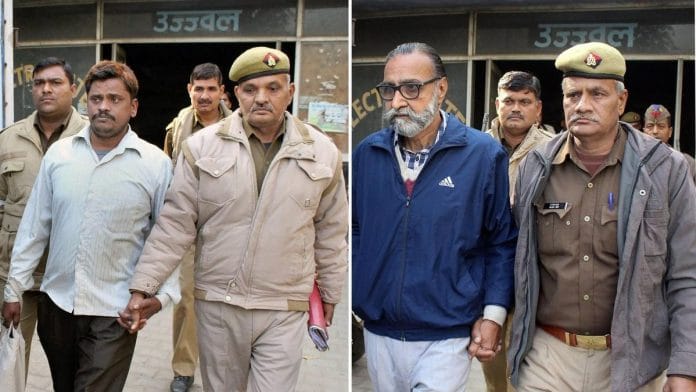New Delhi: There was no forensic evidence of cannibalism, no blood stains on the knife and axe that were seized by investigators, and no semen match with the main accused in the case — this is what the Allahabad High Court noted in its acquittal order in the murder and sexual assault of Victim ‘A’, one of several in the Nithari serial killings.
On Monday, the court acquitted Surinder Koli in 12 cases and his employer Moninder Pandher in two — all pertaining to the 2005-06 serial killings in Nithari in Uttar Pradesh’s Noida — citing lack of evidence. The HC, in the ‘Victim A’ case judgment, relies heavily on Koli’s confession made in police custody, which it says was “taught” by investigation agencies.
In his confession before the police on 1 March, 2007, Koli had described elaborately how he allegedly lured the victims, tried to rape them after they are unconscious, and then killed them, even cooking some of their body parts in pressure cookers and eating them.
But in a statement before the magistrate, he claimed he was made to “memorise” the names of the victims.
In its ruling, the Allahabad HC poked several holes in the prosecution’s case, not only pointing to the lack of forensic evidence to support police claims of sexual motive and cannibalism but also casting doubts on the alleged weapons used in the offence.
Here’s a breakdown of what the court said in this particular case.
Also Read: ‘Murder, cannibalism to attempted necrophilia’ — gory timeline of cases against Nithari accused
No cloth, no chunni, doubts on knife recovery
The court ruling dwells on two alleged murder weapons — a knife and an axe — that police claim to have seized from House No. D-5, where Pandher and Koli lived.
Police claim that the knife was discovered on 1 January, 2007, and the axe on 18 January, 2007, on the basis of Koli’s “disclosures”. But according to the court, investigators had thoroughly swept the area on 29 December, 2006 — days before the alleged weapons were discovered. “Recovery of an article from a space which is in control of police does not amount to discovery” and raises doubts, the ruling says.
The “mere” recovery of a knife from the house of the accused without any blood stains, flesh, or any other forensic evidence linking it to the killings cannot be treated to be an “incriminating fact”, the judgment stated.
The court also raised questions on the credibility of the knife saying it was muddy despite being found on the concrete terrace of the house. In this context, doubts were also cast on the police’s “seizure memo” — a list of all possible evidence seized by law enforcement authorities and the places they were found in — to say that it didn’t have a description of the size of the knife.
Further, although the panchnama mentions suspicious stains on an axe the prosecution claims was used to dismember victims’ bodies, forensic reports didn’t find any blood on it, the judgment said. It adds that two pieces of evidence — a chunni allegedly used to strangle Victim ‘A’ and a cloth used to murder the other victims — were not produced during trial.
No blood stains, no forensic evidence to corroborate cannibalism
In its ruling, the Allahabad HC also held that the discovery of limbs and skulls without torsos isn’t sufficient to support claims of sexual motive for the murders.
In addition, while Koli said in his alleged confession that the polythene bags he had used to stuff body parts were thrown behind the gallery of D-5, police records show that these were found buried on the premises, the order said.
It quoted the case’s investigating officer, Chote Singh, as having admitted that the window in the help’s quarters where Koli lived was at a height of 25 feet. It is, therefore, “beyond the realm of possibility” that polythene bags stuffed with body parts wouldn’t leave blood stains on the wall, the court said, adding that this falsifies Koli’s confession about the disposal of the bodies.
In addition to this, there was no forensic evidence on any of the materials seized in the case to prove the prosecution’s claim of cannibalism, the ruling said.
“A team of experts from FSL Agra (Forensic Science Laboratory) conducted a thorough examination of House No. D-5 and seized all articles with even the hint of any suspicious stains. The CBI also constituted a team of experts from AIIMS (All India Institute of Medical Sciences) who examined House No. D-5 minutely and collected various samples on 12.1.07 and 13.1.07. However, neither any human remains, nor blood-stained clothes, nor any blood-stained articles such as carpets etc. were found,” the high court said in its judgment.
The HC observed that the semen and the blood found on the victim’s clothes didn’t match the samples taken from Koli’s quilt. It also said that although a seven-member forensic team had visited D-5, barring a blood spot in the bathroom sink and pipe of unknown origin, no other biological or forensic material was found in the house.
(Edited by Uttara Ramaswamy)






